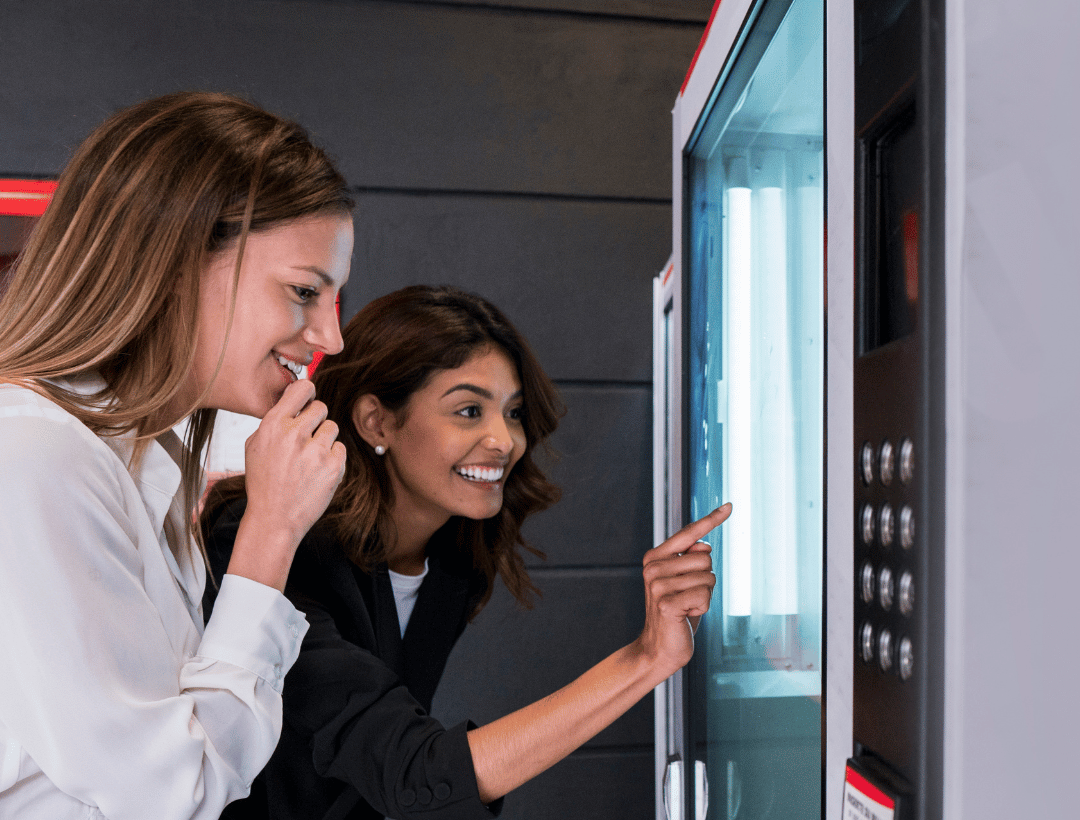The image of vending machines as outdated, sugar-filled boxes collecting dust in the corner is officially a thing of the past. Today’s vending machines are smart, sleek, and integrated into the modern business landscape—offering more than just snacks. They deliver convenience, customization, and in many cases, a surprising boost to employee satisfaction and customer experience. And with no installation or maintenance costs in most cases, they’re one of the simplest ways to add value to a business space.
For business owners navigating tight labor markets or rethinking office perks, vending machines can quietly solve multiple problems at once. They reduce foot traffic out of the building during break times, support health-conscious food choices, and offer refreshments 24/7 without the overhead of a staffed café or pantry. From contactless payments to remote monitoring and energy efficiency, technology has transformed vending into a strategic business tool.
It’s not just theory—industry trends show that vending is becoming a more relevant channel for everyday purchases. In fact, according to the State of the Vending Industry Report, consumers are increasingly embracing vending as a convenient, hygienic, and health-forward option for both snacks and beverages. This shift is being felt across industries, from corporate offices and schools to gyms and apartment complexes.
Still, vending isn’t a one-size-fits-all solution. The type of business, volume of daily foot traffic, and expectations of employees or visitors all play critical roles in determining whether a machine will thrive—or sit unused.
In this article, we’ll walk through various industries and evaluate how (and if) vending machines can support their operations. Whether you run a small fitness studio or a high-traffic warehouse, this guide is designed to help you assess if vending is the right fit for your business model.
Offices & Corporate Workspaces
In today’s hybrid and competitive work environments, employers are looking for practical ways to support employee wellness, satisfaction, and retention. Vending machines can be a subtle but powerful tool in that effort—especially in offices and corporate workspaces where accessibility and convenience can influence the flow of a workday.
Think about it: every time an employee leaves the office to grab a snack or drink, productivity takes a hit—not just in minutes lost, but in momentum. By installing a strategically placed vending machine in a breakroom or common area, businesses offer on-site solutions that help reduce disruptions while still meeting everyday needs.
The most effective office vending machines tend to include a well-balanced product selection. Fresh food options, low-sugar snacks, and hydrating beverages go a long way in supporting employee health initiatives. Many companies now align their vending inventory with broader workplace wellness goals, creating a more thoughtful and supportive breakroom experience. For more tips on stocking the right products, see our post on how to choose the right inventory for your vending machine.
Another benefit? Modern vending machines are tech-forward. They support contactless payments, track inventory in real-time, and can even offer digital promotions or feedback tools. That means less hassle for the business owner or office manager and a smoother experience for employees.
Whether you manage a small startup or a multi-floor corporate headquarters, vending machines offer a low-lift amenity that enhances the employee experience. With no upfront costs for installation or restocking in most cases, it’s a smart addition to consider as part of your workplace infrastructure.
Manufacturing Plants & Warehouses
In industrial environments like manufacturing plants and warehouses, the pace is fast, the shifts are long, and access to amenities is often limited. For business owners and operations managers, providing quick and consistent access to food and beverages can be a challenge—especially when break schedules are tightly controlled or staff work overnight hours.
That’s where vending machines shine. With 24/7 availability, they meet the demands of a workforce that operates around the clock. Workers don’t have to leave the facility or rely on external food delivery, which may be limited in remote or industrial zones. Instead, they get immediate access to energy-boosting snacks, cold drinks, and even basic meal items without leaving the premises.
Popular inventory for industrial vending setups includes protein bars, electrolyte drinks, sandwiches, granola, and high-calorie snacks that help sustain energy during physically demanding shifts. Machines can be tailored to include healthier options as well, supporting wellness goals and offering more variety to meet different preferences.
From a logistics standpoint, vending machines require minimal upkeep from the facility itself. Most providers offer routine restocking, maintenance, and remote monitoring—keeping everything running smoothly without burdening internal teams. And for companies focused on employee retention or safety, offering well-stocked break areas signals that management values workers’ time and well-being.
When placed in high-traffic zones like breakrooms, locker areas, or near production exits, vending machines become an effortless part of the workflow. For facilities operating three or more shifts, having reliable, round-the-clock access to food isn’t just a nice-to-have—it’s a smart move that helps keep people fueled and focused.
Gyms & Fitness Centers
Health and fitness environments are natural candidates for vending machines—but not just any kind. Today’s gym-goers are more informed and intentional about what they consume, and they expect options that support their lifestyle. That means high-protein snacks, low-sugar energy drinks, hydration boosters, and even supplements tailored to pre- and post-workout routines.
For gym owners and fitness studio managers, adding a vending machine is an efficient way to generate passive income and enhance member satisfaction. Whether it’s a 24-hour fitness center or a boutique studio, vending provides a no-staff-required solution to offer value without adding overhead.
Placement is key. Machines near exits or locker rooms allow members to grab a snack or drink on their way out, while reception areas offer great visibility to encourage impulse purchases. Because many fitness centers operate outside of traditional business hours, machines with cashless payment options are essential—offering debit, credit, and mobile wallet functionality for maximum convenience.
Inventory customization is another huge plus. Unlike traditional gym cafés, vending machines can be stocked with carefully chosen products that reflect the brand’s philosophy—whether that’s clean ingredients, plant-based nutrition, or performance-focused snacks. Some fitness businesses even rotate inventory seasonally or in line with popular programs like HIIT, weightlifting, or endurance training.
If you’re running a gym, yoga studio, martial arts school, or similar fitness space, a vending machine can serve as an extension of your member services. It’s not just a snack station—it’s a reflection of your brand’s commitment to health and convenience. And with machines that require no upfront investment or maintenance, it’s a low-risk, high-reward addition to the space.
Schools, Colleges & Universities
Educational institutions—from K-12 schools to sprawling university campuses—have unique needs when it comes to food accessibility. Students, faculty, and staff often operate on tight schedules, making it difficult to leave campus or stand in long cafeteria lines. Vending machines can help bridge that gap by offering accessible, fast options throughout the day and even after traditional food service hours.
For schools, vending services offer an efficient way to provide quick access to snacks and drinks without requiring additional staff or resources. They’re ideal for placement in hallways, teacher lounges, libraries, and gymnasiums. Colleges and universities, in particular, benefit from placing machines in high-traffic areas like dormitory lobbies, academic buildings, and study centers.
What makes vending in schools especially relevant today is the growing demand for healthier options. Students and parents are more nutrition-conscious than ever, and educational institutions are adapting. Modern vending machines can be stocked with low-sugar beverages, whole grain snacks, and items that support wellness and academic performance through better nutrition.
In addition to health benefits, vending machines offer flexibility. They serve students who have after-school activities, night classes, or live on campus with limited kitchen access. Machines equipped with cashless payment systems are especially useful on campuses where students rely on mobile wallets or preloaded ID cards to make purchases.
With no staffing required and the ability to monitor inventory remotely, vending machines offer a practical, scalable solution for schools of all sizes. They’re not just about convenience—they’re part of building a more responsive, student-friendly environment that supports both well-being and performance.
Hotels, Salons & Waiting Areas
In hospitality and service-oriented businesses, every detail counts when it comes to guest experience. Whether it’s a hotel lobby, a beauty salon, or a healthcare waiting room, small touches like convenient access to refreshments can leave a lasting impression. Vending machines offer an effortless way to provide that convenience—without the need for staffing or manual inventory management.
For hotels, vending machines are a 24/7 solution that complements front desk services and enhances guest comfort. They’re especially valuable in budget and mid-range accommodations where in-room minibars are not standard. Machines stocked with snacks, beverages, and travel essentials like toothbrushes or pain relievers can help guests feel cared for, especially during late-night check-ins or early departures.
In salons, spas, and barber shops, a vending machine can turn waiting time into a more enjoyable experience. Offering items like sparkling water, organic snacks, or even beauty products adds an extra layer of service that customers remember. And because these environments are often more design-conscious, vending machines can be customized in size, color, or branding to blend seamlessly into the décor.
In medical, vending machines offer practical value. Patients waiting for appointments—or caregivers waiting with them—appreciate easy access to snacks and drinks, especially in facilities where no café is available nearby. Having something as simple as bottled water, crackers, or energy bars can turn a stressful wait into a more manageable experience.
For businesses that deal with constant foot traffic but limited staffing, vending machines offer a high-impact, low-effort upgrade to customer service. They operate silently in the background, delivering convenience and comfort at every hour, without requiring daily attention. And that’s exactly the kind of smart investment that keeps people coming back.
Residential Buildings & Apartment Complexes
In modern residential buildings, amenities are often the deciding factor for prospective tenants. While features like fitness centers and package lockers are becoming standard, vending machines offer a unique opportunity to enhance everyday convenience without adding ongoing costs or management overhead for property owners.
Strategically placed machines—near lobbies, mailrooms, laundry areas, or shared lounges—give residents around-the-clock access to snacks, beverages, and essentials. For tenants who work unconventional hours or parents navigating bedtime routines, having a vending machine just an elevator ride away can be a small but meaningful quality-of-life improvement.
Property managers benefit too. Vending machines require no staffing or upkeep from the building team, as most providers handle restocking and service remotely. And with modern machines offering cashless payments and real-time monitoring, the service runs smoothly without interfering with daily operations. It’s a smart amenity that increases perceived value while keeping operational hassle to a minimum.
Product selection can also be tailored to the building’s demographic. In student housing, that might include energy drinks, ramen, and grab-and-go snacks. In luxury or family-focused buildings, healthier items, sparkling waters, or even pet treats can be added to match residents’ preferences. This kind of customization shows that management is in tune with the community’s lifestyle.
As competition in the rental market intensifies, small but thoughtful upgrades make a big difference. A well-stocked vending machine may not be the headline feature in your property’s brochure—but it can be the reason a resident renews their lease or recommends the building to a friend. It’s an amenity that works quietly and continuously, offering daily convenience in a world where convenience is everything.
When a Vending Machine Might Not Be the Best Fit
While vending machines are a smart addition in many settings, they’re not always the ideal solution. Depending on your business size, foot traffic, and layout, a vending machine may offer less value than expected—or even go unused. Knowing when to reconsider is just as important as knowing when to commit.
For example, small businesses with limited staff and low daily visitor volume might not generate enough demand to keep a machine viable. If only a handful of people walk through your doors each day, restocking frequency and product freshness could become a challenge, even with professional service.
Another factor is space. If your facility has narrow hallways, strict fire code requirements, or already limited common areas, finding a suitable location for a machine may be difficult. Vending machines are compact, but they still require clearance, outlet access, and visibility to be effective.
There are also cases where branding and ambiance are tightly controlled—like boutique retailers or high-end design studios—where a traditional vending machine might not align with the business’s visual identity. In those instances, alternative options such as mini-fridges with curated items or discreet countertop snack displays may be more appropriate.
Finally, if your clientele includes young children, elderly visitors, or individuals with restricted diets, it’s important to assess whether your machine can be stocked with appropriate, clearly labeled choices. Not every provider offers customization to that level, and it may limit your flexibility.
If you’re unsure whether vending makes sense for your space, consider reading our checklist in the upcoming section or get in touch with our team for a no-obligation assessment. The goal is to make the right decision for your environment—not just the most popular one.
Final Thoughts: Matching the Machine to the Mission
Vending machines have come a long way from their basic, one-size-fits-all past. Today, they can be aligned with your business goals, tailored to your audience, and placed with precision in nearly any type of environment—from busy office floors to quiet residential buildings. But success doesn’t come from just installing a machine—it comes from making sure it matches your space, your people, and your priorities.
Before making the decision, it’s worth thinking about more than just snacks. What kind of experience do you want to provide? What kind of traffic does your space see, and at what times? Who will use the machine, and what will they expect from it? The answers to these questions can help determine whether vending is a value-add or a missed opportunity.
If you’ve identified a strong fit, the next step is choosing the right machine, selecting your inventory, and finding a reliable service provider.
Ultimately, the best vending strategy is one that blends quietly into your operation while delivering consistent value—both to your customers and your bottom line. Whether you’re offering healthy snacks to employees or a midnight treat to residents, the right vending machine does more than sell food. It supports your mission, your brand, and the people who rely on you daily.



